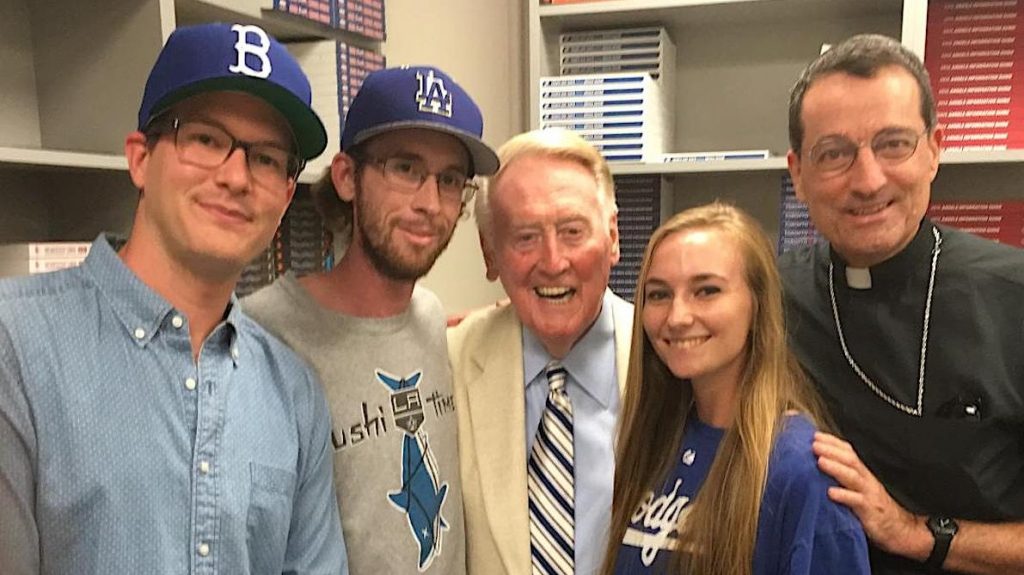We are never to meet our heroes, for to do so opens a window to disappointment. With so many public figures having different faces when cameras and microphones are turned off, it is a rare thing indeed when someone of note and distinction is who he appeared to be.
That was Vin Scully.
When the Dodgers came to LA in the 1950s, Irish Catholic bubbles still dotted the American landscape from sea to shining sea. They were reminders of the recent past when the words “Irish” and “Catholic” were mostly pejoratives. Like most immigrants, the Irish at first stuck together. It was bad because it gave the Irish an inflated sense of themselves. It was good, because it tied us to the democracy of the dead and a faith that went back before the Emerald Isle was a gleam in a Druid’s eye.
The Dodgers’ move West created some instant Irish Catholic role models. The team was owned by the O’Malley family and their young announcer was a redheaded Irish guy from New York. That was all our dad needed to know. We were all going to be Dodgers fans.
Our dad clung to famous Irish and Catholic celebrities and sports figures as symbols of hope with a dash of triumphalism. But so many times those very public figures disappointed him, when their public personas would be punctured one way or another, and he would learn that their faith, integrity, or commitment to their families were not as advertised.
Our dad never had that kind of moment with Vin, who remained in his Catholic Hall of Fame for baseball heroes, alongside Gil Hodges and Stan Musial. They were all men who never missed Mass, took care of their families, and, if they did not wear their faith on their sleeve, they certainly had it tattooed on their hearts.
Hodges and Musial were before my time, but Vin was the bridge for me and my dad that went beyond baseball, veering into a bond about what it means to be a good Catholic man. Vin represented all the best Catholic virtues, according to my dad: He had integrity, empathy, and a wit, quick as it was, that never cut like a knife, but blanketed its objects with joy.
Though I never met Vin in person, I am Vin-adjacent enough to have been close to some of those virtues. About eight years ago, I was planning a media event for a major nonprofit that required me to find someone of high standards to honor. Lots of names were bandied about when it dawned on me that Vin was the perfect honoree. I mentioned it to no one because I did not know Vin, knew of no reasonable way to contact him, and I did not want to overpromise and underdeliver.
I found two possible addresses and wrote letters to each of them, inviting Mr. Scully to our event. I realized it was a total long shot with little hope of success.
I know exactly where I was when my cellphone rang several weeks later. It was another holiday planning meeting. I did not recognize the number, and my usual modus operandi for unknown numbers was to let it go to voicemail. For a reason I cannot explain, I answered. On the other line was the most recognizable voice of my childhood asking if this was “Mr. Brennan.”
I immediately regressed to that 10-year-old boy, lying awake on a war surplus bunk bed on a hot summer night, listening on a small transistor radio to Vin Scully.
He had indeed gotten my invitation and was calling to personally decline. He took great pains letting me down easy, telling me he always supported the organization I was representing but was not comfortable being singled out as anything special. It was pure Vin Scully, and the best “bad news” phone call I will ever receive. I sent an unsolicited letter to him asking him to do my organization a big favor. At best I expected a form letter from his secretary. He gave me his time, his concern, and ended the conversation with a “God bless” I knew he meant.
Six years ago was Vin’s last season as the Dodgers announcer. My then auxiliary bishop of Los Angeles brother had been invited to throw out the first pitch at a Dodgers game. I suggested on a whim that he should go up to the press box along with my young adult son and daughter and see if they could say hello to Vin.
They got into the press box (being a bishop is good for some things). Vin was gracious, welcoming, and called them each by name after introductions. This was the year everyone and their brother (bishop or not) was trying to get in a last farewell. He treated these interlopers like they were long lost friends and the smiles on their faces took days to dissipate.
Vin posed for tens of thousands of photographs like the one he took with my family. You could probably get tens of thousands of responses from other strangers who would still be marveling at feeling the grace he emanated.
Years ago, I was listening to a Dodgers’ game when Vin informed us of a player who was on the injured reserve list. I have long forgotten who the player was, but I have never forgotten how Vin relayed the information. The player’s injury status was listed as “day to day,” which Vin tagged with a perfectly timed quip, “But then, aren’t we all.”
To a man who seemed to live every day of his life like that, I can only say “Requiescat in pace.”

